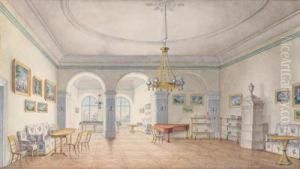Luise Furstin Von Radziwill Paintings
Luise Fürstin von Radziwill, born Princess Luise of Prussia, was an influential figure in the cultural and social circles of Prussia in the late 18th and early 19th centuries. Born on February 24, 1770, in Berlin, she was a member of the House of Hohenzollern, a dynasty that ruled Prussia and eventually all of Germany. Her parents were Prince Ferdinand of Prussia, brother of Frederick the Great, and Princess Margravine Elisabeth Louise of Brandenburg-Schwedt.
Luise married Prince Antoni Radziwiłł of Nieswiez in 1796, a union that connected her to one of the most significant aristocratic families in Poland and Lithuania. Antoni was a prominent statesman, musician, and patron of the arts, and together, they became central figures in the cultural life of their time. Luise herself was known for her intelligence, charm, and cultural sophistication.
Throughout her life, Luise was a patron of the arts and an active participant in the intellectual salons of the period. She developed a close relationship with the famous poet Johann Wolfgang von Goethe and other leading figures of the Weimar Classicism. Her salon in Berlin was a meeting place for artists, musicians, writers, and intellectuals. The Radziwiłłs also maintained a residence in Poland, where they hosted a similar circle of the Polish-Lithuanian Commonwealth's cultural elite.
Despite the turbulent times, including the Napoleonic Wars and the eventual fall of the Polish-Lithuanian Commonwealth, Luise and her husband remained influential through their cultural and charitable endeavors. They were great supporters of Polish national causes and worked to preserve Polish culture and heritage, especially after the partitions of Poland.
Luise Fürstin von Radziwill passed away on July 7, 1836, in Berlin. Her legacy is closely associated with the intellectual and cultural vibrancy of her era. She was not an artist herself, but her role as a patron and her involvement with significant cultural figures of her time had a lasting impact on the arts in Prussia and Poland.
